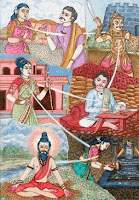12. Bhava-jaladhi-gathanam dvandva-vata hatanam
Suta-duhitru-kalatra-thrana-bhararditanam
Vishama-vishaya-thoye majjatam aplavanam
Bhavati saranam eko vishnu-poto naranam.
Humans drowned in Humans struggling in
worldly attractions the ocean of life
Sriman Narayana is the only boat to reach the shores
1.
Bhava-jaladhi-gathanam – people who are entrapped in worldly existence
2.
dvandva-vata ahatanam – people who are hurt by
the heavy wind or cyclone
3.
Suta- children
4.
duhitru- daughter
5.
kalatra- wife
6.
thrana - protecting
7.
bhara - burden
8.
arditanam – afflicted
9.
Vishama – rude, bad, wicked
10.
Thoya – water
11.
majjatam
- one who has drowned
12.
aplavanam – without a boat
13.
naranam – humans, mankind
14.
Vishnu – Lord Sriman Narayana
15.
pota – ship
16.
eko – only
17.
charanam – support, protection
18.
bhavathu – may it be so
In this verse
Kulasekara Azhwar describes the human beings and their nature. He says that
people are afflicted in the burden of taking care of their wives, children and
daughter and drowned in the bad ocean of deriving the small pleasures of life.
For us humans Sriman Narayana is the only boat to reach the shores. This can be equated to Andal Naachiar’s saying in Naachiar Thirumozhi as “Thunba
kadal puuku vaikunthan enbathor thoni pera thuzhalginren”













